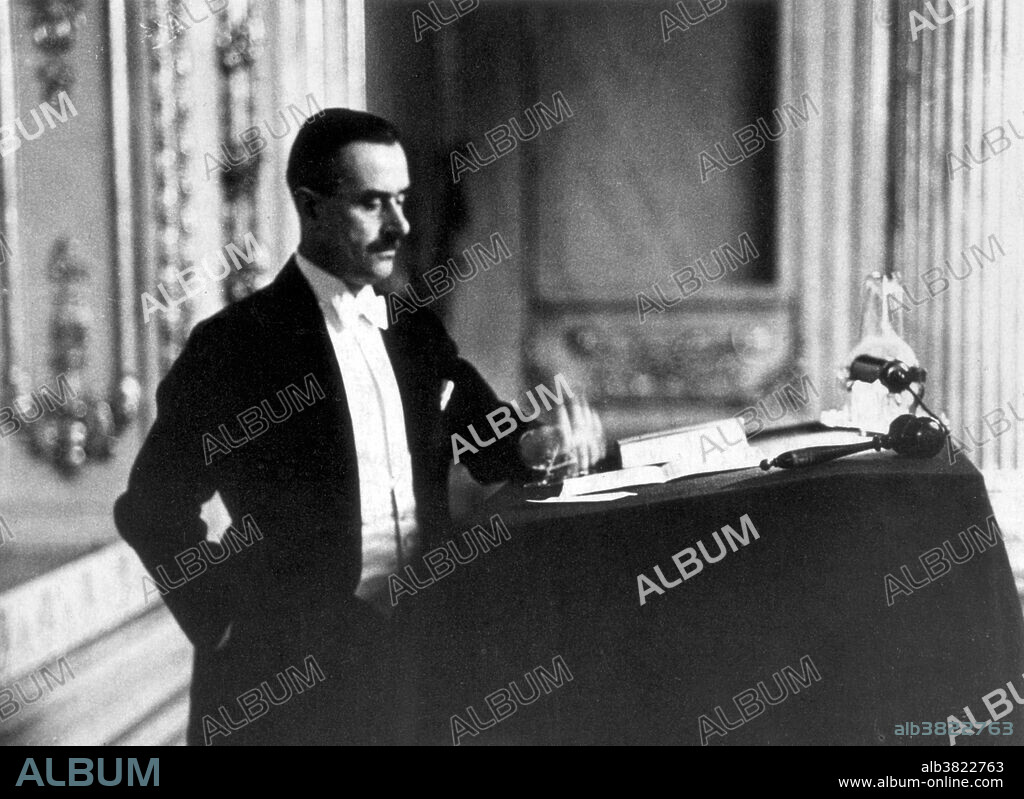alb3822763
Thomas Mann, German Author

|
Añadir a otro lightbox |
|
Añadir a otro lightbox |



¿Ya tienes cuenta? Iniciar sesión
¿No tienes cuenta? Regístrate
Compra esta imagen

Título:
Thomas Mann, German Author
Descripción:
Traducción automática: Mann fotografiado en Estocolmo, 1929. Thomas Mann (6 de junio de 1875 - 12 de agosto de 1955) fue un novelista alemán, cuentista, crítico social, filántropo, ensayista y premio Nobel, conocido por su serie de epopeyas irónicas y altamente simbólicas novelas y novelas cortas, destacadas por su penetración en la psicología del artista y del intelectual. Su análisis y crítica del alma europea y alemana utilizó historias bíblicas y alemanas modernizadas, así como las ideas de Goethe, Nietzsche y Schopenhauer. Se casó con Katia Pringsheim, hija de una rica familia industrial judía secular, en 1905. Más tarde se unió a la fe luterana de su marido. La pareja tuvo seis hijos. Fue galardonado con el Premio Nobel de Literatura en 1929, principalmente en reconocimiento a su logro popular con la epopeya Buddenbrooks (1901), La montaña mágica (Der Zauberberg 1924) y sus numerosos cuentos. Cuando Hitler llegó al poder en 1933, huyó a Suiza. Cuando estalló la Segunda Guerra Mundial en 1939, emigró a los Estados Unidos, pero regresó a Suiza en 1952. Murió en 1955 de aterosclerosis a la edad de 80 años. Los diarios de Mann, abiertos en 1975, hablan de sus luchas con su bisexualidad. que encontró reflejo en sus obras
Mann photographed in Stockholm, 1929. Thomas Mann (June 6, 1875 - August 12, 1955) was a German novelist, short story writer, social critic, philanthropist, essayist, and Nobel laureate, known for his series of highly symbolic and ironic epic novels and novellas, noted for their insight into the psychology of the artist and the intellectual. His analysis and critique of the European and German soul used modernized German and Biblical stories, as well as the ideas of Goethe, Nietzsche, and Schopenhauer. He married Katia Pringsheim, daughter of a wealthy, secular Jewish industrialist family, in 1905. She later joined the Lutheran faith of her husband. The couple had six children. He was awarded the Nobel Prize in Literature in 1929, principally in recognition of his popular achievement with the epic Buddenbrooks (1901), The Magic Mountain (Der Zauberberg 1924), and his numerous short stories. When Hitler came to power in 1933, he fled to Switzerland. When World War II broke out in 1939, he emigrated to the United States, but returned to Switzerland in 1952. He died in 1955 of atherosclerosis at the age of 80. Mann's diaries, unsealed in 1975, tell of his struggles with his bisexuality,which found reflection in his works.
Crédito:
Album / Science Source / New York Public Library
Autorizaciones:
Modelo: No - Propiedad: No
¿Preguntas relacionadas con los derechos?
¿Preguntas relacionadas con los derechos?
Tamaño imagen:
3900 x 2840 px | 31.7 MB
Tamaño impresión:
33.0 x 24.0 cm | 13.0 x 9.5 in (300 dpi)
Palabras clave:
1929 • ALEMAN • AUTOR • BLANCO Y NEGRO • ESCRITOR • ESTOCOLMO • FAMOSO • FIGURA • FOTO • FOTOGRAFIA • GANADOR DEL PREMIO NOBEL • GENTE • HISTORIA • HISTORICO • HOMBRE • HOMBRES • IMPORTANTE • LITERATURA • MASCULINO • NOVELISTA • PERSONA • PERSONALIDAD • PERSONALIDADES • PREMIO NOBEL • RETRATO DE HOMBRE • RETRATO • SIGLO XX • THOMAS MANN
 Pinterest
Pinterest Twitter
Twitter Facebook
Facebook Copiar enlace
Copiar enlace Email
Email
